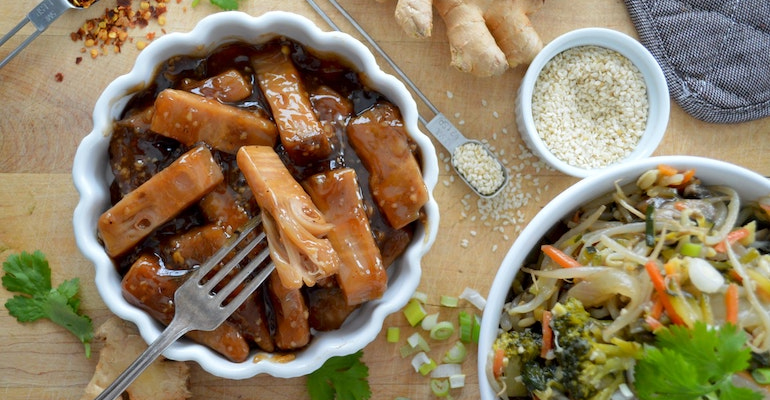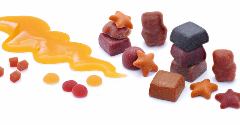News
Cultivated fat is a potential popular addition to plant-based products
21 Jan 2021Cultivated fat might be the next ingredient to melt the hearts of fans of plant-based products, with two-thirds of plant-based meat companies interested in incorporating the ingredient into their recipes, according to a survey Peace of Meat.
The company is already working to take advantage of this interest by creating fat from chicken and duck cells which it intends to commercialize through hybridized products that it is crafting in partnership with plant-based meat manufacturers. There are not yet any products available on the market. Peace of Meat is a cultivated fat producer that is a subsidiary of the cell-based meat provider Meat-Tech 3D.

Cultivated fat is an ingredient that toes a fine line. It is not vegan, but it is also not derived from animals. Instead, the fat is produced by growing animal fat cells in a nutrient solution. These cells are identical to those in a live land-roaming animal, but they do not require an animal to be killed. Peace of Meat’s survey underscores the appeal of having access to an animal product that has identical qualities to traditional components of animal ingredients but from an animal-friendly and sustainable source.
Creating plant-based products that have real animal fat incorporated into their recipes has the potential to help alleviate the No. 1 concern associated with plant-based protein: taste. Consumers primarily make their selection of plant-based substitutes based on taste, according to a 2019 white paper by Kerry. This is not surprising due to the fact that 89% of those consuming plant-based products are meat eaters, per an NPD study.
However, cultivated animal products still pose problems, including the fact that there are plenty of governmental and regulatory hurdles still in place worldwide that hinder the mass commercialization of these products. Despite the difficulties, progress toward approval is being made, and Singapore recently became the first country to approve a cell-based meat chicken product.
Companies and consumers remain undeterred in their interest in sustainable solutions to traditional animal husbandry. As a result, there is widespread interest in cultivated animal products, and particularly in cultivated fat. Last spring, Spanish cultured fat startup Cubiq Foods secured 5 million euros in funding for its omega-3 rich fats and San Francisco-based Mission Barns began testing its cultured pork fat in bacon strips.
Cell-based fats may even appeal to consumers that are more concerned with health than taste. Dieticians have routinely criticized plant-based burgers for not being as healthy as they seem with sodium and saturated fat contents that are the same as beef patties. By introducing cultured animal fat into the process, manufacturers will have the ability to selectively render the ingredient to feature more healthy fats, such as omega-3s, which can then transform plant-based burgers into an even more appealing better-for-you alternative.
Related news

Bone broth: From old-fashioned to en vogue
24 Nov 2025
OXO’s entry into bone broth has turned the spotlight on this small but high-performance category – and there is still scope for growth, especially in the area of GLP-1 support.
Read more
Matcha madness: Why green is this year’s hottest colour
19 Nov 2025
Five years ago, it was a struggle to find matcha outside of Japan. Now it seems to be popping up everywhere, from coffee shops to supermarket shelves.
Read more
How younger consumers are redefining ingredient choices and rejecting brand loyalty
18 Nov 2025
Gen Z and millennial consumers’ preferences for transparency, functionality, and purpose are “redefining the very nature of consumption itself”, says SPINS.
Read more
Hybrid formats and flexible positioning to disrupt category norms in 2026
17 Nov 2025
Trend forecasters expect food and drink to move more fluidly across occasions, functions, and formats as consumers seek versatility, novelty, and convenience.
Read more
Empowering innovation in fortification and colouration
13 Nov 2025
Divi’s Nutraceuticals offers a large portfolio of innovative, high-quality ingredients for foods, beverages, and supplements, with bespoke solutions and expert support for product success.
Read more
Predictive maintenance redefines powder mixing reliability
13 Nov 2025
Mill Powder Tech's smart control systems harness real-time data to help the food and biotech sectors achieve zero downtime and smarter output, alongside rigorous GMP standards and ambitious ESG goals.
Read more
From fruit to functional solutions: Meet Paradise Fruits at Fi Europe in Paris
13 Nov 2025
Paradise Fruits Solutions and Paradise Fruits Health will showcase their combined expertise in delivering innovative, fruit-based solutions to the food and beverage industry at the upcoming Fi Europe trade show (2-4 December 2025, Paris).
Read more
Danone highlights digestive health as potential ‘tipping point’ for food industry
13 Nov 2025
Danone is betting on a food industry “tipping point” that will bloat the market for healthy products, particularly those related to gut health.
Read more
Bord Bia presents Irish dairy ingredient suppliers at Fi Europe
6 Nov 2025
Dairygold Co-operative Society, The Carbery Group, and Ornua Co-operative: Meet with sustainable producers of Irish dairy ingredients at Food ingredients Europe 2025, Hall 7.2 Stand M18.
Read more
Ingredient quantities mislabelled on popular protein bars, independent tests show
5 Nov 2025
Some popular protein bars contain more fat, carbs, and/or sugars than claimed on their labels, independent nutrition testing reveals.
Read more